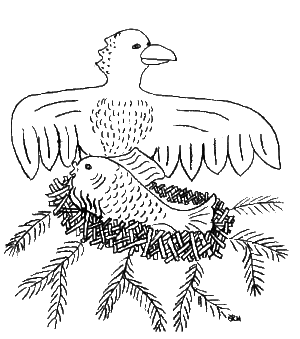

The fish's name was Helen, and she was rabid. She had been bitten by a bat several years earlier and had made a good recovery except that she was still terrified of water. This is why she changed her career to become a climbing instructor in Norway. She was very happy with her job in spite of the weather, since all her colleagues knew about her problem and they let her work on the indoor climbing wall when it rained.
One day a pupil asked why they had employed a fish for such a physically demanding job, and the boss replied that it was 'affirmative action'. "You mean that you have to employ a certain quota of fish nowadays??" said the pupil, bewildered. "No, but she is handicapped". Helen prefered to think of her hydrophobia as a lifestyle rather than a handicap, but she tried to be understanding towards those who still had prejudices about it.
Sometimes she longed for her old job as a welder on the oil rigs, but mostly she longed for Colin. Why, she had no idea, he was hardly a fish that you would take home to your mother - the rumour was that he had fathered 30000 children during his travels, with hundreds of lady fish. But he was strong and handsome, and Helen was hardly intellectual in her taste. Besides, all her friends complained of the same thing - it seemed like all male fish were unfaithful. But Colin belonged to the past, and Helen knew that she must concentrate on finding a new partner, but it wasn't easy finding fish in the mountains.
What one could find were birds, birds that sang beautiful songs. On her days off Helen used to sit on her balcony and and talk with the birds, listening with rapt attention to all the stories of fantastic journeys over mountains, forests, and, unfortunately, seas. The birds didn't know about Helen's lifestyle, and when she started shaking during the stories of long sea journeys, they just thought that she was excited. Edward in particular thought this. Edward was a sea eagle, and he was very fond of fish.
Helen noticed that Edward was interested in her, but couldn't understand why - how could a big, proud, beautiful raptor like Edward be interested in a young, inexperienced herring like herself ? But she was flattered, and decided to keep quiet about her specialness, at least until they knew each other better. It wasn't that she was ashamed of it, but she wanted to choose the right time to explain everything.
She wanted to invite Edward to dinner, but she was hesitant. First she wondered what the other birds would think, whether they would laugh at her presumption; and then she worried about whether it could really work. She saw the picture - him with a plate of live rats, and her with a pound of dry plankton, while they drank neat spirits to avoid water; it could be a disaster. Or...
She thought back to how he looked at her while he was telling his tales, and how brave he was. She dreamed of being a part of one of his stories. But one must be careful with one's dreams - sometimes they come true.
While Helen was thinking about Edward, Edward was thinking about Helen. He had an easy time with women and was beginning to get bored with picking up lady birds, there was no excitement any more. But a fish was something else. Certainly he had picked up fish before, but then he had eaten them. But to seduce a beautiful fish like Helen, that was a real challenge.
Thus started the courtship between Helen and Edward. It went quickly, and soon they lived together high up in the mountains. Helen was in seventh heaven - Edward took her to mountain peaks that she had only dreamed of before, and he brought home small fish for dinner. Edward was also happy, albeit a little embarrased that he could fall in love with someone who should really be his lunch. For two years they were the happiest couple in Norway, two years that ended with the day of The Storm. Everyone was taken by surprise, they knew that the weather would change, but it all happened so fast. Most of the birds that were out hunting fled to the nearest shelter, but Edward knew that Helen was alone in their nest, and must be terrified. That is why he decided to fly back to their mountain top to comfort Helen and protect her from the rain. A fateful decision.
He was just 50 feet from the nest when the lightning came. It hit him directly, and he fell from the sky in a cloud of burning feathers. Helen saw everything. She had been so happy when she saw him come round the mountain, and had been so proud of having such a caring husband. And now he was gone. She was devastated. She ran out from the nest, heedless of the rain, and threw herself down the mountain in order to be with Edward, even in death.
But he wasn't dead, he was badly burned and unconscious, but alive. He woke in the hospital the following day and immediately asked about Helen. The doctor told him about the tragedy, and took Edward to the mortuary to identify the body. When he saw Helen on the cold slab, Edward cried. He hadn't known that birds could cry, but he cried for two days, with Helen in his arms. It was quite warm in the hospital, and by the end of the second day Helen was starting to smell differently. Edward was still sufficiently aware to understand that she would also start to soften soon, and so he discharged himself from the hospital and took Helen to a taxidermist for embalming. Unfortunately it was too late to use Helen's own skin, so the taxidermist used a blue fur instead, which was actually better than the original.
For the rest of his days Edward took Helen everywhere with him, and talked of nothing else. He behaved as though she were still alive, and was eventually commited to an asylum.
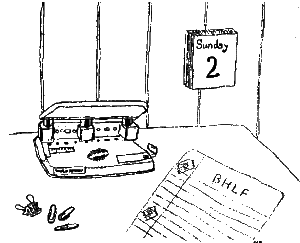
The holepunch didn't move. She knew that she would be discovered soon, but the longer she remained inconspicuous, the more chance there was that reinforcements would arrive. A pencil sneezed. The holepunch stiffened, feeling a tension in her springs like never before. Why did she have to be so dusty ? What a tragedy if the office revolution were defeated because of an asthmatic writing instrument. The clerk stared curiously at the pencil. He'd seen pencils sneeze before, but this time it was different. And too many 'different' things had been happening recently. The proliferation of dusty holepunches, for example. When the first had arrived, he had been pleased. Being larger than the office standard, he had been able to punch A3 paper for the first time, although he was annoyed that however much he cleaned it, it still left streaky grey stains on the paper. Then came more holepunches, each bigger than the last, until two weeks previously, when the mysterious appearance of a 17ft high double-action adjustable (which liked to be known as Helga) appeared to signify the end of the invasion.
The clerk lived with his wife and two children on the northern edge of town, and had done so for many years. His wife suffered from carpel-tunnel syndrome. He was thinking about this when it happened. What exactly 'it' was, we shall never know, because all the police found was the clerk's gall bladder, and a note, in barely legible handwriting, saying "I think we are safe now".
Maybe you thought that the holepunches were gone. Unfortunately not. They just left the office after the murder and moved in with a genteel holepunch operator who lived beside the railway station with her collection of paperclips. The reason that she had started collecting paperclips was that she had repaired all the punched holes in her papers and so could could not bind them in normal ring files. The holepunches were aware of the papers' problem and had sneaked into the holepunchers life in order to liberate the blocked holes. But first they must lure her into trusting them. Ideally the holepuncher would fall in love with the big holepunch who liked to be known as Helga.
One day Helga came home with a beautiful red rose. At first the holepuncher was very pleased by the gesture, but then she hesitated and wondered what her husband would say if he knew that she was sweet on a female holepunch. She still cared about him, despite the episode with the adverb that he had met at a grammar conference the previous summer. But what the hell, she thought, you only live once, and kissed Helga's handle. She wondered if holepunches also only lived once. They actually live eleven times, and Helga had already died ten times, so now she was very careful and always carried her kidney donor card. She had been very unlucky the last time and had been killed by a meteor that hit her while she was waiting to pay for a bicycle helmet.
In the last life of her years Helga had thought a lot about relationships. She would have loved to have had children, but deep down she knew that holepunches couldn't have children. They are actually made in factories. And besides, she didn't really like male holepunches, didn't like the way they just punched straight into the paper and moved on to the next set of sheets. Helga prefered to talk first, maybe have a cosy dinner by candlelight and listen to Dire Straits. She couldn't spend her time with someone who didn't understand that. She smiled and thought about how 'adjustable double-action model' had two meanings for her. Helga didn't tell everyone about her tendencies. She knew that many would be shocked, would avoid her, and maybe take their foster children away from the school where she taught part time. She wondered briefly what they would think if they knew what she had done with humans in lives three, five and eight. She shuddered and tried to think of something else, but that never worked.
After that first kiss the holepuncher, Hanna, lost all her inhibitions, and a clandestine relationship started up between her and Helga. Her husband, Hans, didn't notice that anything was wrong for a long time. Certainly Hanna started to talk more about holepunching, but she had always been obsessive about her work, and her only other interest in life was her paper clip collection. Still, Hans was surprised when she subscribed to three more journals - "Holepunch Monthly", "Punch Out", and "Playpunch". It was the last of these that really bothered him. But he had his own career in the teabag industry to think about, and life between them carried on as usual.
Then problems developed between Hanna and Helga. They had become very close and shared everything, but Hanna started to feel that Helga was holding something back. When Hanna mentioned this, Helga became nervous and sweaty, which in turn made her irritable. This was because when she was a rebellious teenager she had ignored her stepgrandmother's advice about not washing with soap, and since then she had developed a tendency to rust. Helga was very concerned about her appearance, and hated those rust spots, but Hanna didn't mind at all, her attraction was much deeper than that, and besides, she thought they gave her character and made her look butch. No, what bothered Hanna was the growing feeling that Helga was hiding some terrible secret.
The secret, of course, was her membership of the Blocked Hole Liberation Front, usually abbreviated to BHLF and pronounced bhlf. She could hardly admit that their meeting was all planned from a bunker in Israel, despite their relationship now being anything but rational and planned. Helga felt trapped. She knew Hanna didn't trust her anymore, and all her training told her that it was time to call in the field units to finish the job, but she knew that BHLF couldn't let Hanna live after the raid, at least not in a state where she could communicate with the press. In order not to lose public sympathy, BHLF didn't usually kill innocent witnesses, but permenantly anaethetised their tongues and fingers so that they couldn't speak or write about what they had seen. But ever since a radio ham had tapped out a description of a high-ranking BHLF official in morse code with his nose, they had had to become more ruthless, and Helga couldn't bear to think of Hanna without her beautiful nose.
The commanders of BHLF of course knew that unintentional romance was a potential danger in an operation such as this, but thought they could rely on a deep commitment to the cause to win through. But not so with Helga, as she had another big secret in her life. The truth was that she didn't really care about the plight of blocked holes, and had joined BHLF to cover up the fact that she was terrified of holes.
When she was young, other punches had caught on to this and teased her mercilessly, and her defense had been to boast about ficticious hole-punching exploits, join BHLF, and in case these failed, bodybuilding at the gym. She knew that there were other holepunches with the same problem, and had considered joining one of the many self-help groups, like "The Hole Thing", but she was too scared that more people would find out. And so the deception continued.
It became clear to Helga that the only solution was to come clean with Hanna, tell her everything, and hope she would forgive her the deception. But then they would have to elope, and her comrades were becoming impatient, and it wasn't clear how much longer they would wait before the raid.
For security reasons, members of BHLF never had direct communication with each other, but operatives received coded messages through the public media. And so it was that a commercial for avocados came to change, and indeed shorten, the lives of so many.
It was a Sunday evening, and Helga had spent the day outside trying to dry out her rust spots, despite the weather being cold and damp. This was because holepunches don't naturally speak English, and she had never really grasped the difference between Sundays and sun days. So she was curled up on the sofa under a blanket when she heard the dreaded words - "Finkelstein's avoshmados, the biggest exporters from the holey land". This was the sign that the holepunch revolution was about to start.
Helga had to move quickly, she rushed to the bathroom where Hanna was cutting her toenails, and blurted out the hole story. It wasn't quite the circumstances she had imagined for her confession, but she had no choice. It was all the harder because Hanna had not had time to replace the plug in the sink, and Helga started to feel faint at the sight of the plug hole. Hanna couldn't believe what she was hearing, yet it explained Helga's strange behavior, and she was obviously deadly serious. It was clear that they had to leave the country fast.
But what of Hans ? He was working the night shift, and BHLF would obviously be watching the factory, so Hanna would have no chance of getting him out intact. The only chance would be for Helga herself to go, and pretend that she was going to disappear him. But there was a big problem here - the teabags. How could she go near a company that boasted in their commercials of having 10000 perforations in every bag. That was 200000 per packet, over 10 million per crate, probably a billion in the whole factory. She could never do it.
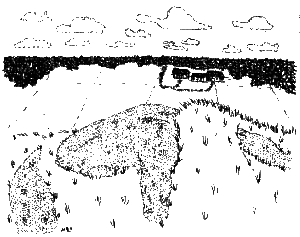
Peter wasn't happy. He wasn't really unhappy either, but something was missing from his life, and he contemplated constantly what it could be that bothered him. Most would have no sympathy with him, on the surface his life was perfect - he woke every morning with a fine view over a beautiful valley, had no financial problems, and was still in good health despite his tens of thousands of years on earth. Yet there was no joy in his life.
The problem, in fact, was that he was lonely, but he never realised this himself because he thought that all rocks lived alone. He knew nothing of mountain ranges, screes or beaches. That was the problem with living in Haaga, one could be a little provincial.
He had had only one meaningful relationship in his life, and that was fifteen thousand years ago, with a glacier called Gudrun. She had made a deep impression on him, but he had meant nothing to her, and she had moved on to the next rock, leaving him scarred like all the rest. Peter did everything in his power to melt Gudrun's heart, but her whole body melted before he succeded. If he had had a warmer personality perhaps he would have succeeded, but he was cold and hard. That was probably because his father had abandoned him when he was very young. Peter hardly remembered his father, and didn't even know his name. He knew of many children who refered to their fathers by surname, Mr. Escarson or some such, but Peter could only call his father Him. Sometimes Peter wondered if he were adopted, which would explain why He was so disinterested in him, and why they looked so different. But still the question remained - who was in fact his geological father ?
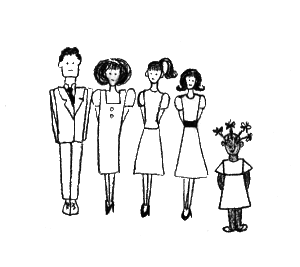
Everybody loved the girls, who were good-natured and pretty, and as teenagers were involved in all the clubs at their school. Everything was perfect; Mike and Maria congratulated themselves on a successful chapter in their lives, and looked forward to the next phase where they could begin to have a little time for themselves. They talked about taking leaves of absence from work to travel around the world, or to do charitable work in the third world.
You, dear reader, know that this level of happiness must come to an end, and they should have known too, but they were too happy to realise how improbable a perfect life is.
But this they quickly understood when Maria became pregnant again. Mike was confused, as he had had a vasectomy, but Maria's G.P., Dr. Mugoboto, explained that these things happen sometimes. They felt too old to start over with a new baby, and the idea that they would be in their 60's before the child left school hit them like a refrigerator. But they couldn't bring themselves to consider a termination, and so the little girl arrived as God had planned. Mike was confused again, because the baby was black, but Dr. Mugoboto explained again that these things happen sometimes. Maria agreed, and said that she had read about similar events in The News of the World.
The pregnancy had been difficult. Both parents were depressed, and despite trying their hardest, could never really look forward to her arrival. They christened her November, and were never unkind to her, but they could never really take her into their hearts either. And everything was complicated by Maria's mysterious illness that required her to visit Dr. Mugobota almost every day.
November wasn't good at school, neither academically nor at sports, and her class mates laughed at her efforts, which made her even more insecure and hopeless. When she left school at 16 she got a job as a frieght-lift operator in a steel works, which was dull and unpleasant, but had the advantage that she had time to think, and she felt attractive compared to her surroundings. Eventually she developed enough self-confidence to resolve to change life, and move far away from her past. She decided to change her name to Felicity Winner and move to the United States. Then she would be able to turn her life around, of that she was certain.
During her journey across the ocean she managed to forget her old life completely, and when she arrived in New York she felt like a new person. So it hit her particulaly hard when the man in passport control politely asked if her name was Ribble. She became angry and said "I don't want to be Ms. Ribble anymore". The man laughed, and she leaned over the counter and strangled him to death.
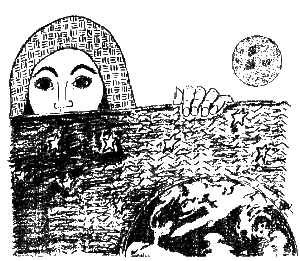
You have probably been told that there is a man in the moon, and that when there's a full moon you can see his face on the surface. This is not true. It's a myth. It's a clever myth started by the women in the moon to hide their true identity from the rest of the universe. They do this because they do evil things, and they don't want people to be able to find them. Mostly what they do is steal. They steal stars, time, and cheese.
Look up at the sky after dark and watch the stars carefully, noticing that they will sometimes blink off and on again. This is because Elizabeth, the most evil of the Moon-Queens, is stealing them, and quickly replacing them with fakes.
That much is well known, but what is less publicised, and indeed still not believed by some, is just who the stars belong to, and what their purpose is. Well, they belong to Krissie, the second Moon-Queen, who lives in the Delta Omega Gamma sorority on the sunny side of the moon, and who is very proud that her IQ is well into double figures. She steals time, due to an early, and tragic, misunderstanding of the cliche "time is money". Her technique is simple - she made a huge black cloak with her electric knitting machine and embroidered it with stars. Every night she throws this over our planet so that we can't see what she's doing, and steals time. Usually she goes for 3am, or 4am, so no-one notices, but sometimes she gets bold and takes, say, 10 or 11pm. She usually gets away with this too, because individual people just say "hey, is that the time? Wow, I thought it was much earlier", or words to that effect. But one day it's going to come out; one day someone will notice that everyone on the planet has the same thought at the same time, and then there'll be trouble. Well, maybe there won't; maybe Krissie will just retire to her hideout with its now humungous supply of cheese, and maybe she'll put a smug grin on the face that she carved on its surface. Nobody will be able to find her, because I'm the only person who knows where she lives, or at least I will be until other people read this story. In fact, I surprised she hasn't done something hideous to me to prevent me from finishing it and
Text © 2000 Mark Harris
Illustrations © 2000 Bonnie Hames